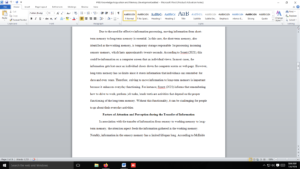Knowledge Acquisition and Memory Development
Prior to beginning work on this assignment, please read When Forced Fabrications Become Truth: Causal Explanations and False Memory Development, view How Your “Working Memory” Makes Sense of the World, Elizabeth Loftus: How Reliable Is Your Memory?
For this paper, you will be explaining some of the cognitive-based ideologies related to how memory development works, how it is affected by outside variables, and how strategies can improve one’s own information processing. You will demonstrate an understanding of psychological research methods and skeptical inquiry by correctly utilizing support resources within your writing.
Complete the following:
- Introduce the topic of effective knowledge or memory development (including assimilation and accommodation) based on cognitivism.
- Explain, precisely, the mental process of knowledge or memory development.
- Include the importance of successfully moving information from working (short-term) memory to long-term memory (effective information processing)?
- Discuss the factors of attention and perception in association with successfully moving information from sensory to working memory to long-term memory.
- Discuss the predominant variables that can affect effective processing for each of the following types of memories: semantic memories, episodic memories, and autobiographical memories.
- (Hint—emotions, outside distractions, etc.)
- Discuss the prevalence of false memories, and how this phenomenon may affect how we learn effectively, as well as help others to learn accurately.
- Conclude with a summarization of your paper’s content (conclusion paragraph).
The Knowledge Acquisition and Memory Development paper
- Must be a minimum of five double-spaced pages in length (not including title and references pages) and formatted according to APA Style as outlined in the Ashford Writing Center’s APA Style (Links to an external site.) resource.
- Must include a separate title page with the following:
- Title of paper
- Student’s name
- Course name and number
- Instructor’s name
- Date submitted
- Must utilize academic voice.
- Must include an introduction and conclusion paragraph. Your introduction paragraph needs to end with a clear thesis statement that indicates the purpose of your paper
- Must include APA headings
- Must use at least two scholarly or peer-reviewed sources published within the last five years in addition to the course text
- Must document any information used from sources in APA Style as outlined in the Writing Center’s
- Must include a separate references page that is formatted according to APA Style as outlined in the Writing Center.
Requirements: Five double space pages
Answer preview
Due to the need for effective information processing, moving information from short-term memory to long-term memory is essential. In this case, the short-term memory, also identified as the working memory, is temporary storage responsible for processing incoming sensory memory, which lasts approximately twenty seconds. According to Syrett (2021), this could be information on a computer screen that an individual views. In most cases, the information gets lost once an individual closes down the computer screen or web page. However, long-term memory has no limits since it stores information that individuals can remember for days and even years. Therefore, striving to move information to long-term memory is important because it enhances everyday functioning. For instance, Syrett (2021) informs that remembering how to drive to work, perform job tasks, brush teeth are activities that depend on the proper functioning of the long-term memory. Without this functionality, it can be challenging for people to go about their everyday activities.
[1721 Words]

Knowledge Acquisition and Memory Development

